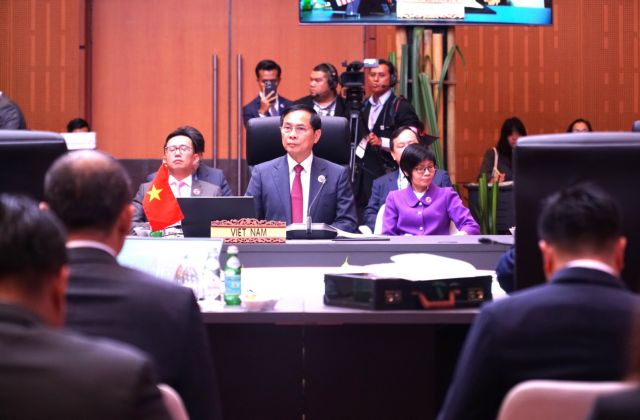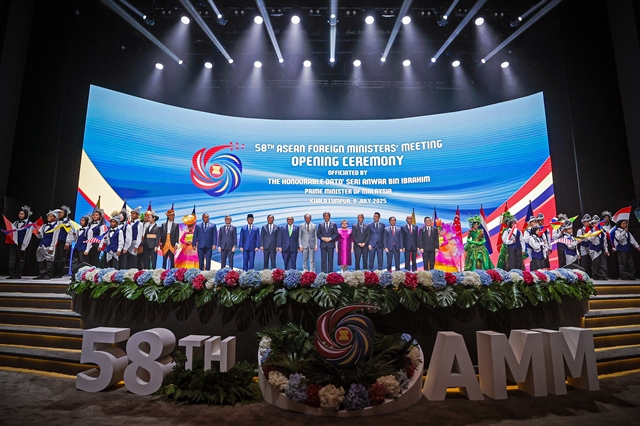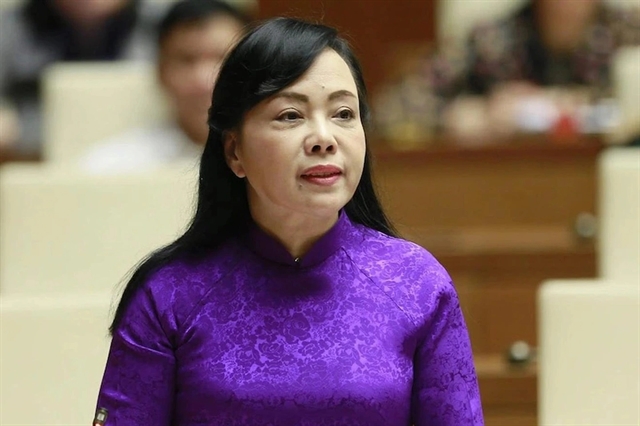 Politics & Law
Politics & Law


|
| Deputy Prime Minister and Minister of Foreign Affairs Bùi Thanh Sơn at the plenary session of the ASEAN Foreign Ministers’ Meeting in Kuala Lumpur on July 9. — VNA/VNS Photo |
KUALA LUMPUR — Deputy Prime Minister and Minister of Foreign Affairs Bùi Thanh Sơn has proposed three key priorities to reinforce ASEAN’s central role amid rising regional and global uncertainties at the plenary session of the ASEAN Foreign Ministers’ Meeting in Kuala Lumpur on Wednesday.
His proposals included driving economic growth to make ASEAN the world’s fourth-largest economy by 2030, building a leading digital community and deepening people-to-people connectivity to advance a more inclusive and action-oriented ASEAN.
The plenary, which followed the official opening of the 58th ASEAN Foreign Ministers’ Meeting (AMM-58), focused on implementing decisions made at the 46th ASEAN Summit and charting the path forward for ASEAN Community-building efforts.
Ministers emphasised the need to sustain ASEAN’s role as a platform for cooperation, dialogue and strategic trust. They also agreed to accelerate the implementation of the ASEAN Community Vision 2045 and associated strategies, calling on all ASEAN sectoral bodies to identify priorities and translate high-level directions into concrete actions.
Particular emphasis was placed on enhancing intra-regional trade and investment, facilitating trade, expanding connectivity in infrastructure, energy grids, digital networks and diversifying external partnerships. Ministers also stressed the importance of strengthening ASEAN’s resilience to emerging growth drivers and responding to the impacts of climate change, natural disasters and extreme weather events.
Sơn reaffirmed the core values that underpin ASEAN’s success, including unity and mutual respect. In today’s volatile environment, he noted, ASEAN’s centrality, unity and strong commitment to inclusive and sustainable development must continue to serve as guiding principles.

|
| Foreign ministers take a group photo at the official opening of the 58th ASEAN Foreign Ministers’ Meeting (AMM-58) Kuala Lumpur on Wednesday. VNA/VNS Photo |
Building on that foundation, he put forward three strategic directions:
First, ASEAN must prioritise robust economic growth to achieve its target of becoming the world’s fourth-largest economy by 2030. This involves deepening intra-regional economic integration and effectively implementing the upgraded ASEAN Trade in Goods Agreement (ATIGA), while leveraging existing FTAs with partners and expanding inter-regional linkages, particularly through the Regional Comprehensive Economic Partnership (RCEP). ASEAN should also capitalise on e-commerce to unlock internal trade potential and expand into new markets and supply chains.
Second, ASEAN should accelerate negotiations on a Digital Economy Framework Agreement that meets real-world needs, especially for micro, small and medium-sized enterprises. New growth drivers like digital transformation and innovation ecosystems should be embedded into ASEAN’s cooperation frameworks with external partners to attract resources and technical support. These efforts must also be reflected in ASEAN’s own programmes and subregional cooperation initiatives. As Chair of the ASEAN Initiative for ASEAN Integration (IAI) Task Force, Việt Nam will coordinate the implementation of these initiatives under the next IAI Work Plan.
Third, ASEAN must deepen its engagement with the people. Beyond high-level declarations, ASEAN’s presence must be felt through concrete and meaningful actions. The region’s communication strategy should be enhanced to widely promote ASEAN’s achievements and contributions through real stories of individuals and communities. Việt Nam will soon develop a national implementation plan for ASEAN’s strategic 2045 documents to bring ASEAN closer to its citizens, businesses, and localities.
Sơn also reaffirmed Việt Nam’s support for Timor-Leste’s accession to ASEAN and its readiness to assist the country in fulfilling membership criteria, including participation in legal instruments. He called on ASEAN to develop a clear roadmap to support Timor-Leste’s effective integration and full implementation of member obligations.
Earlier, in his opening address to AMM-58, Malaysian Prime Minister Anwar Ibrahim stressed the need for ASEAN to remain proactive, strategically autonomous and united in shaping the region’s future amid mounting global volatility.
He said ASEAN’s true strength lies in its solidarity, cohesion and commitment to overcoming differences through mutual respect, dialogue and consensus.
He warned against the weaponisation of economic tools for geopolitical competition and urged ASEAN to act with clarity and resolve. ASEAN, he emphasised, must determine its own path with purpose, vision, and ambition. It should promote meaningful integration and stronger coordination across diplomatic and economic pillars to build an inclusive and sustainable economy.
PM Anwar also highlighted key cooperation areas that directly benefit people, including connectivity, food security, digital transformation, education, healthcare and climate resilience.
He expressed hope to welcome Timor-Leste as ASEAN’s next official member and called on member states to support its integration not only institutionally but as part of ASEAN’s shared regional vision. — VNS




